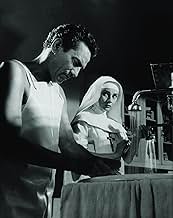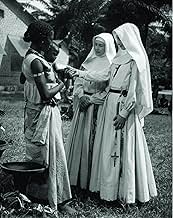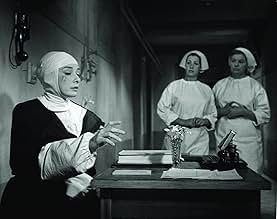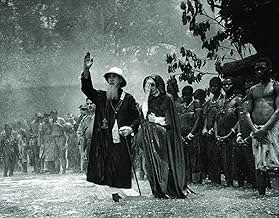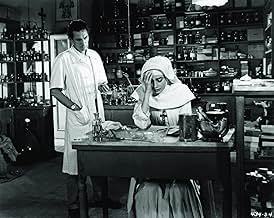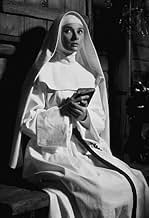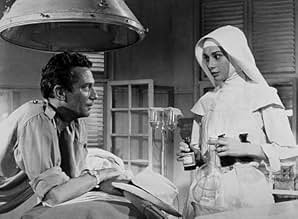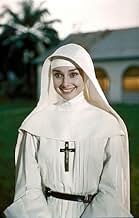Em 1930, Gabrielle Van der Mal entra para um convento para se tornar freira, enfermeira e missionária no Congo Belga. Mas a dureza da vida de clausura e a obediência aos seus votos vão fazê-... Ler tudoEm 1930, Gabrielle Van der Mal entra para um convento para se tornar freira, enfermeira e missionária no Congo Belga. Mas a dureza da vida de clausura e a obediência aos seus votos vão fazê-la duvidar da sua fé e da sua vocação.Em 1930, Gabrielle Van der Mal entra para um convento para se tornar freira, enfermeira e missionária no Congo Belga. Mas a dureza da vida de clausura e a obediência aos seus votos vão fazê-la duvidar da sua fé e da sua vocação.
- Direção
- Roteiristas
- Artistas
- Indicado a 8 Oscars
- 11 vitórias e 23 indicações no total
- Rev. Mother Emmanuel (Belgium)
- (as Dame Edith Evans)
- Mother Mathilde (Africa)
- (as Dame Peggy Ashcroft)
- Direção
- Roteiristas
- Elenco e equipe completos
- Produção, bilheteria e muito mais no IMDbPro
Avaliações em destaque
Audrey Hepburn - sans makeup and the kind of fashion-plate wardrobe that had already become the hallmark of her movie career - delivers one of her richest performances as the strong-willed and fiercely independent Sister Luke, whose very psyche is torn asunder by the battle between her own innate, personal pride and a sincere desire to live a life of obedience to the Church and its rules. With everything but her countenance hidden beneath a nun's habit, Ms. Hepburn is forced to draw on her resources as an actress, having to convey the titanic internal conflict taking place within her character almost entirely through facial expressions, vocal intonations and body language. And she proves herself more than equal to the challenge. She is brilliantly complemented by Peter Finch, playing the cynical but humane Dr. Fortunati, a dedicated surgeon who is as concerned about Sister Luke's spiritual health as her physical health. The relationship between the two is handled with a great deal of subtlety and tact, never allowing the obvious romantic attraction between the two attractive people to come too much to the fore. Rounding out the excellent cast are Dean Jagger as Gabrielle's loving and concerned father, Peggy Ashcroft and Mildred Dunnock as two older nuns who help guide Sister Luke along the way, and the incomparable Edith Evans, simply astounding as the Reverend Mother who sees unwavering devotion to God and the Church as the one and only goal of a serious nun.
Among other things, "The Nun's Story" is that rare film dealing with religion and spirituality that doesn't contain a single hokey or sentimental moment, that knows the difference between religion and religiosity, that is respectful without being unduly reverential, and that acknowledges the complexity of the human heart in matters of devotion and faith. It also is not afraid to take its time to set the scene and tell its story, never feeling the need to rush headlong into the next dramatic moment just to keep the movie going. In a perfect blending of form and content, the film is every bit as thoughtful, subtle and contemplative as its subject matter, its mood greatly enhanced by the rich and beautiful Franz Waxman score that underlines the seriousness of the work.
In addition to all its other fine virtues, "The Nun's Story" features one of the greatest final scenes and closing shots in motion picture history, a masterpiece of precision and understatement that demonstrates the kind of taste Zinnemman always displayed as a director. The movie is made up of small, beautifully observed moments that, when put together, provide a powerful glimpse into the heart and life of a fascinating, caring individual who wants to do great things in the world but who realizes that the path she has chosen is not the one that will ultimately lead her to her rightful destiny.
On every level of film-making, this is truly one of the greats.
This is an utterly fascinating story of a young nun (Audrey Hepburn), and a non-believing doctor (Peter Finch). Sister Luke (Hepburn) is constantly challenged in sticking to her vows, especially the one of obedience.
She chaffed at the rules that did not leave room for common sense. Is it better to strictly obey or to do more good in disobedience? It is a question asked over and over.
Things become more difficult as WWII starts. Now, the rules must be set aside to help the war effort. Eventually, the conflict between the rules and her need for independence is resolved.
Hepburn was fantastic, as was Finch. Well worth seeing.
Gabrielle van der Mal enters a convent in Belgium with the lukewarm approval of her surgeon dad. She is a trained nurse and has a heart for nursing, specifically in the Congo, which was a colony of Belgium's at the time. The film follows her through her first year and a half in the convent until she takes her final vows, the trials and tribulations she faces there, and her delay in finally being assigned to the Congo as a nurse.
This is a great film that doubles as a good documentary on what is involved in becoming a nun, so much so that I'd say that Gabrielle really didn't so much want to be a nun as she figured this was the only path to getting to serve in the Congo as a nurse - a primitive place with a great need for medical professionals of all kinds.
When Gabrielle finally does get to the Congo and has served as OR nurse to the agnostic Dr. Fortunati, she is panicked when the day comes that she is ordered to return to Belgium. Gabrielle isn't so much someone who sees herself as a rebel within the church - this is the tradition that she grew up in and she seems fine with it - as much as she sees everyday life in the convent as boring and tiresome, especially after several years of being a nurse in the Congo and being so very helpful.
Neither does she have a huge problem with forgiveness. In Africa a native beats another nun to death for no other reason than a witch doctor told the man that if he killed a white woman that the ghost of his dead wife would stop haunting him. In spite of the pointlessness of the murder, in spite of the fact that she knew the murdered nun, Gabrielle has sympathy and forgiveness in her heart for the killer. But then she returns to Europe and the Nazis invade and quickly take over Belgium. When they kill her father while he is tending to some refugees, Gabrielle realizes her heart is not big enough to forgive such systemic cruelty. At that point she must make a choice.
This film is based upon a novel written by Kathryn Hulme, the partner of Gabrielle van der Mal for over thirty years, until Hulme's death in 1981. Perhaps it was because the author was so close to Gabrielle that the main character is so well examined.
anyone who thinks she was only a fashion model is well advised to see this film. I first saw it in a theatre, in 1959. I went in about five minutes before the end--and the theatre was completely sold out. At the end of the movie, no one moved--everyone remained seated for about thirty seconds. Then the audience got up and filed out--without a single sound. I stayed through to see the ending again. The audience behavior was the same. I have never seen an audience reaction like this.
Hepburn should have received an Oscar for this performance, as well as another for "Two for the Road," for which she wasn't even nominated. She has been sadly underrated and undervalued as an actress. Her high placement in many Best Actress Ever polls has been entirely justified and very pleasing.
Você sabia?
- CuriosidadesThe role of Sister Luke was suggested for Ingrid Bergman but Bergman herself said she was too old for the role and instead proposed Audrey Hepburn.
- Erros de gravaçãoWhen the patient in the Congo hospital is being attended by several people, the voice of the actor playing the patient is obviously dubbed over by actor Dean Jagger, who plays Sister Luke's father in the film.
- Citações
Sister Luke: You can cheat your sisters, but you cannot cheat yourself or God.
Rev. Mother Emmanuel: Have you struggled long enough to say surely that you've come to the end?
Sister Luke: I think I've been struggling all these years, Reverend Mother. In the beginning each struggle seemed different from the one before it. But then they began to repeat, and I saw they all had the same core: obedience. Without question, without inner murmuring. Perfect obedience as Christ practiced it. As I no longer can.
Rev. Mother Emmanuel: Yes?
Sister Luke: There are times when my conscience asks which has priority. It or the Holy Rule? When the bell calls me to chapel, I often have to sacrifice what might be the decisive moment in a spiritual talk with a patient. I'm late every day for chapel or refectory or both. When I have night duty I break the Grand Silence because I can no longer cut short a talk with a patient who seems to need me. Mother, why must God's helpers be struck dumb by five bells in the very hours when men in trouble want to talk about their souls?
- ConexõesFeatured in Hey Dad..!: Testing Time (1990)
- Trilhas sonorasVoi Che Sapete
from "The Marriage of Figaro"
Written by Wolfgang Amadeus Mozart (as W. A. Mozart)
Played by Gabi and her father on the piano, and recurring throughout the film's score.
Principais escolhas
- How long is The Nun's Story?Fornecido pela Alexa
- Is "The Nun's Story" based on a book?
- Why did Gabrielle want to become a nun?
- Why was Gabrielle's name changed to "Sister Luke"?
Detalhes
- Data de lançamento
- País de origem
- Idioma
- Também conhecido como
- The Nun's Story
- Locações de filme
- Brugge, West-Vlaanderen, Bélgica(Convent exteriors, other exteriors)
- Empresa de produção
- Consulte mais créditos da empresa na IMDbPro
Bilheteria
- Orçamento
- US$ 3.500.000 (estimativa)
- Tempo de duração2 horas 29 minutos
- Cor
- Proporção
- 1.85 : 1
Contribua para esta página



